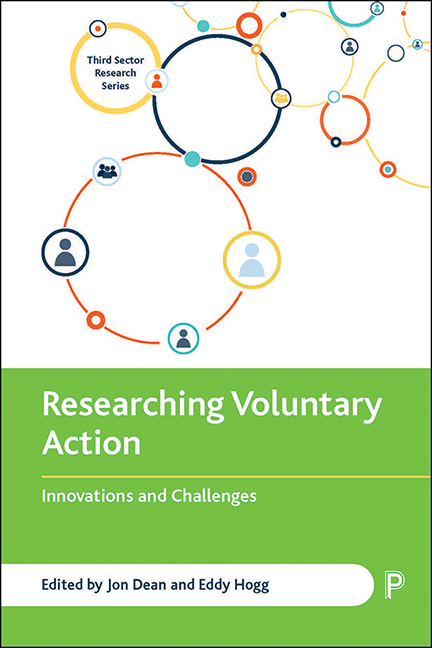Book contents
- Frontmatter
- Contents
- List of figures, tables and boxes
- Notes on contributors
- Acknowledgements
- Series editor’s foreword
- 1 Introduction
- 2 (Un)suitable methods and reflexive considerations: an interview and focus group study of youth volunteering
- 3 Interpretive ethnography: a UK charity shop case study
- 4 Collaborative philanthropy and doing practically relevant, critical research
- 5 Peer research: co-producing research within the context of voluntary and community action
- 6 Charity advertising: visual methods, images and elicitation
- 7 Using archives and objects in voluntary action research
- 8 Using Mass Observation as a source of qualitative secondary data for interdisciplinary longitudinal research on voluntary action
- 9 Investigating meanings and messages on volunteering through television media
- 10 Annual reporting in voluntary organisations: opportunities for content analysis research
- 11 Researching risk in the voluntary sector: the challenges and opportunities of regulatory data
- 12 Exploring the benefits of volunteering: combining survey and administrative data in the Nordic ‘laboratory’
- 13 Spatial approaches to the voluntary sector
- 14 Restudies, surveys and what counts as volunteering
- 15 Conclusion
- References
- Index
5 - Peer research: co-producing research within the context of voluntary and community action
Published online by Cambridge University Press: 15 September 2022
- Frontmatter
- Contents
- List of figures, tables and boxes
- Notes on contributors
- Acknowledgements
- Series editor’s foreword
- 1 Introduction
- 2 (Un)suitable methods and reflexive considerations: an interview and focus group study of youth volunteering
- 3 Interpretive ethnography: a UK charity shop case study
- 4 Collaborative philanthropy and doing practically relevant, critical research
- 5 Peer research: co-producing research within the context of voluntary and community action
- 6 Charity advertising: visual methods, images and elicitation
- 7 Using archives and objects in voluntary action research
- 8 Using Mass Observation as a source of qualitative secondary data for interdisciplinary longitudinal research on voluntary action
- 9 Investigating meanings and messages on volunteering through television media
- 10 Annual reporting in voluntary organisations: opportunities for content analysis research
- 11 Researching risk in the voluntary sector: the challenges and opportunities of regulatory data
- 12 Exploring the benefits of volunteering: combining survey and administrative data in the Nordic ‘laboratory’
- 13 Spatial approaches to the voluntary sector
- 14 Restudies, surveys and what counts as volunteering
- 15 Conclusion
- References
- Index
Summary
Introduction
Peer research is a method that supports people who have ‘lived experience’ of the research topic to be involved in the research process (Logie et al, 2012). This chapter introduces peer research as an engaged approach to researching voluntary action. As a voluntary action researcher I have been working within and alongside voluntary agencies for 20 years, both within the voluntary sector and within a university context. This chapter has emerged out of my work on a number of evaluation research projects. As well as providing some practical guidance about how peer research can be designed and put into action, I discuss the potential strengths and challenges of the method, drawing on examples of both good and challenging practice from my work. As part of a research team, I have been on a journey of learning ‘on the job’, and this learning continues.
Before delving into the ‘how to’ of peer research, it is useful to understand the context of the approach; co-production within the voluntary sector; and how research communities can learn from and incorporate a co-production ethos. The aim is not to disappear down a theoretical rabbit-hole but, rather, to consider what these broader, underpinning considerations mean for how we approach peer research within a voluntary sector setting without slipping into issues of tokenism, or unsatisfactory research processes and outcomes.
The insights presented within this chapter are born out of several evaluative research programmes that I have been involved in as a researcher within the Centre for Regional Economic and Social Research at Sheffield Hallam University in the UK. As part of a small team of researchers, I have worked with my colleague Nadia Bashir to lead the development of our peer research work on projects alongside voluntary sector partners including a local housing association and a regional learning and skills provider (among others).
The voluntary sector organisations that we have worked with have been keen and supportive partners, eager to embed co-production principles in their work, often beyond the research project that we are involved in.
- Type
- Chapter
- Information
- Researching Voluntary ActionInnovations and Challenges, pp. 46 - 58Publisher: Bristol University PressPrint publication year: 2022



